Poppy Seeds Metabolism: Understanding the Process

Did you know a single poppy seed can cause a false positive on a drug test? We will explore poppy seeds metabolism, including enzymes, biochemical reactions, and their impact on food safety and regulations. This fact shows how complex the metabolism of these small seeds is.
Poppy seeds are common in foods but their chemical makeup is not well-known. This study looked into how poppy seeds change during processing. It used advanced analysis to find important compounds that show the seed’s quality.
This study shows how changes in chemical makeup relate to the seed’s processing and conditions. It highlights the power of advanced analysis in food quality control. This is especially useful for industries working with poppy seeds.
Introduction to Poppy Seeds and Their Metabolism
Poppy seeds are small, kidney-shaped seeds from the opium poppy plant (Papaver somniferum). They are used in many foods, making them popular among cooks and chefs. These seeds are packed with healthy fats, protein, fiber, and important vitamins and minerals.
What are Poppy Seeds?
Poppy seeds come from the opium poppy plant, Papaver somniferum. They are used in foods for their nutty taste and texture. The plant is grown for poppy seeds, opium for medicine, and other alkaloids for drugs.
Nutritional Value and Culinary Uses
Poppy seeds are full of nutrients, offering health benefits. They have healthy fats, protein, fiber, and vitamins like iron, magnesium, and zinc. You can find them in bread, pastries, sauces, and as a garnish for dishes. They’re a staple in Eastern European and Middle Eastern cooking.
| Nutrient | Amount per 100g |
|---|---|
| Calories | 525 kcal |
| Total Fat | 45.4g |
| Protein | 18.1g |
| Carbohydrates | 28.1g |
| Fiber | 7.7g |
| Iron | 1.3mg |
| Magnesium | 370mg |
| Zinc | 4.7mg |
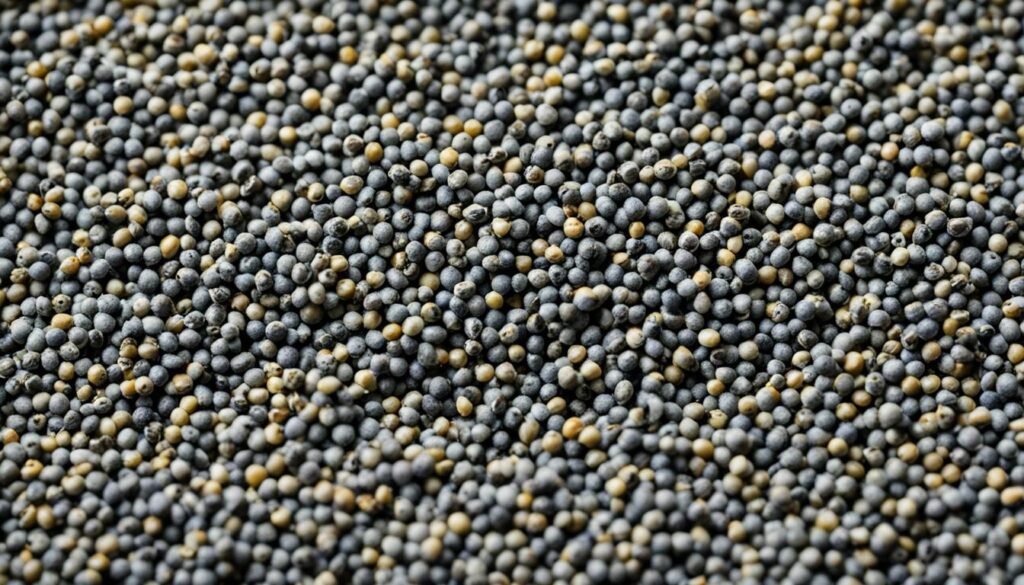
“Poppy seeds add a delightful crunch and nutty flavor to a variety of baked goods and savory dishes. They are a versatile ingredient that can elevate the taste and texture of any culinary creation.”
Metabolic Pathways Involved in Poppy Seed Metabolism
Poppy seeds have complex metabolic pathways and key enzymes. These pathways make various opiate alkaloids like morphine and codeine. Knowing how these enzymes and reactions work is key for food processing and drug testing.
Key Enzymes and Biochemical Reactions
The making of opiate alkaloids in poppy seeds starts with enzymes. First, L-tyrosine turns into (S)-norcoclaurine with norcoclaurine synthase. Then, more reactions happen, including methylation and oxidation, with enzymes like salutaridine synthase and thebaine synthase. These reactions end with morphine, codeine, and thebaine.
These enzymes and reactions are spread out in the poppy plant. Salutaridine forms in sieve elements, but the last steps happen in latex-rich laticifers. This setup helps control the production of opiate alkaloids.

The amount of key enzymes in poppy seed metabolism affects the levels of morphine and other compounds. Knowing about these biochemical reactions is vital for food safety and drug testing.
Poppy Seeds Metabolism: Understanding the Process
Poppy seeds’ metabolism is closely tied to many factors. These include the environment, how they are processed, and their genetic makeup. It’s important to watch these processes closely. This ensures the safety and quality of products made from poppy seeds. It also helps with drug testing and following rules.
Proton nuclear magnetic resonance (1H NMR) is a key tool for studying poppy seeds. It looks at the molecular changes during rancidity and brewing. This method, along with multivariate data analysis, can track how rancidity and brewing change poppy seeds.
Researchers found some compounds in poppy seeds that are key to understanding their metabolism. This method, called metabolic fingerprinting, is useful for checking the quality of food products. It’s especially helpful for companies that work with poppy seeds and other oilseeds.
| Key Findings | Significance |
|---|---|
| Proton nuclear magnetic resonance (1H NMR) analysis of poppy seeds | Provided insights into molecular changes during rancidity and brewing processes |
| Metabolic fingerprinting using multivariate data analysis | Served as a bioprocess control tool to monitor quality and progression of poppy seed-based products |
| Identification of low molecular weight compounds as biomarkers | Enabled quality control in food industries processing poppy seeds and other oilseeds |
Studying poppy seeds has also shown how stable they are against heat and oxidation. This is key for their use in industry. Researchers have also looked at other parts of the plant, like Carica papaya L. leaves and seeds. They used 1H NMR spectroscopy and multivariate statistical analysis for this.
Knowing how poppy seeds work is important when dealing with opiate alkaloids and drug testing. Researchers point out the challenges poppy seed foods can cause in drug tests. They suggest being careful with these products and keeping an eye on them.
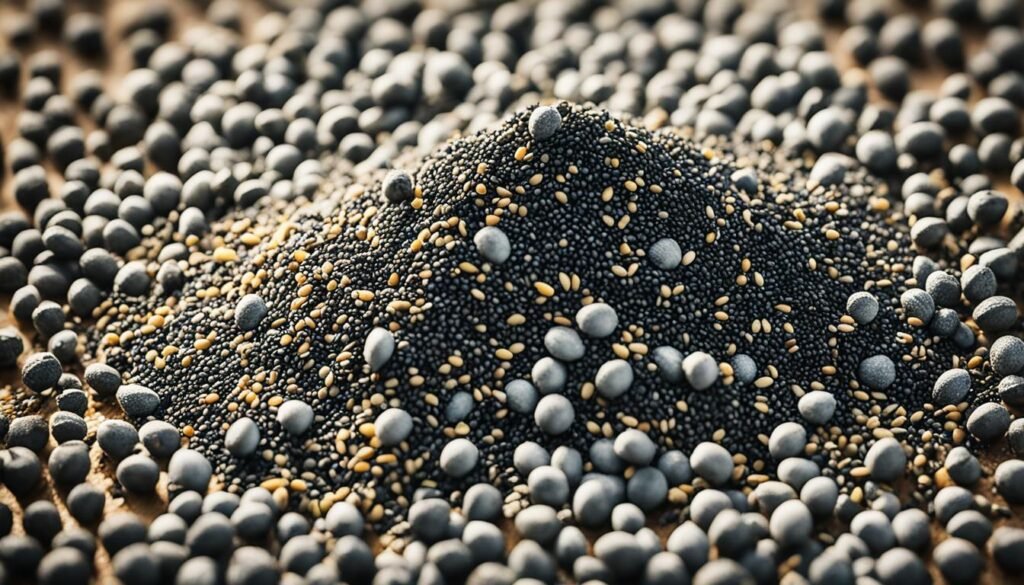
Studying poppy seed metabolism has big benefits. It helps with quality control in food processing and understanding how valuable compounds are made. As we learn more about poppy seeds, knowing their metabolism will be key. It will help make sure poppy seed products are safe, quality, and follow the rules.
Factors Affecting Poppy Seed Metabolism
The metabolism of poppy seeds is complex and influenced by many factors. These factors are important for growing, handling after harvest, and making food products better.
Environmental Conditions
Things like temperature, humidity, and sunlight affect poppy seed metabolism. These factors change how much opiate alkaloids and other important substances are made. Keeping the right conditions during growing and storing poppy seeds is key for quality.
- Temperature: Changes in temperature change how enzymes work and affect the making of poppy seed metabolites.
- Humidity: High humidity helps microorganisms grow and makes more secondary metabolites, changing poppy seed metabolism.
- Sunlight exposure: How much sunlight affects the making of certain alkaloids in poppy seeds.
Processing Methods
How poppy seeds are processed and stored changes their metabolism and opiate alkaloid levels. Drying, milling, and storage conditions all play a part. It’s important to know how these methods change poppy seed metabolism to make food products better.
- Drying: The way seeds are dried, the temperature, and time can keep volatile compounds and affect the metabolic profile.
- Milling: Milling equipment and how fine the grind is can change how much metabolites are taken out of the seeds.
- Storage conditions: Temperature, humidity, and oxygen levels during storage can change how stable and degrade poppy seed metabolites.
Knowing what affects poppy seed metabolism helps food makers and researchers. They can grow, process, and store poppy seeds better. This ensures poppy seed products are always good quality and safe.
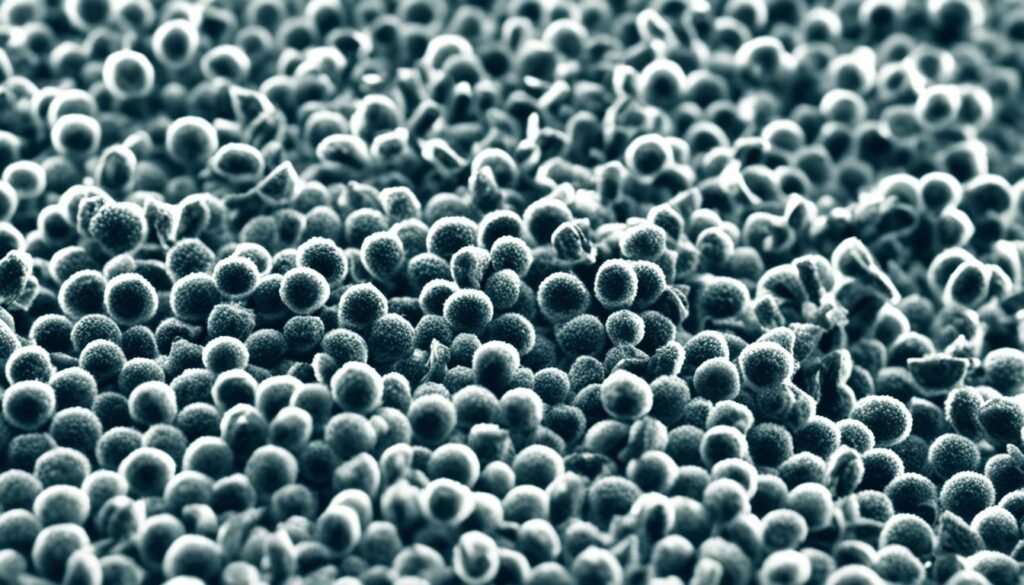
| Factor | Impact on Poppy Seed Metabolism |
|---|---|
| Temperature | Affects enzymatic activities and biochemical reactions, leading to changes in metabolite levels |
| Humidity | Can promote microbial growth and secondary metabolite production, impacting the overall metabolic profile |
| Sunlight exposure | Influences the synthesis of light-sensitive compounds, such as certain alkaloids |
| Drying | Method, temperature, and duration can impact the retention of volatile compounds and the metabolic profile |
| Milling | Type of equipment and grind fineness can affect the surface area exposure and extraction of metabolites |
| Storage conditions | Temperature, humidity, and oxygen presence can influence the stability and degradation of metabolites |
Biomarkers of Poppy Seed Rancidity
Keeping poppy seeds fresh and of high quality is key for their use in cooking and industry. Researchers have found certain compounds that show if poppy seeds are going rancid. These biomarkers help food experts use metabolic profiling techniques to keep an eye on the seeds’ condition.
These biomarkers are volatile organic compounds (VOCs) made when poppy seeds oxidize and break down. By watching these biomarkers, experts can tell how fresh and rancid the seeds are. This helps them make smart choices about how to process, store, and share the seeds.
Some important biomarkers for poppy seed rancidity include:
- Aldehydes, such as hexanal and 2-hexenal, which show lipid oxidation
- Ketones, like 2-heptanone and 2-nonanone, linked to fatty acid breakdown
- Alcohols, including 1-hexanol and 1-octen-3-ol, from enzymatic and non-enzymatic reactions
By tracking these biomarkers from start to finish, food makers and quality teams can spot and fix poppy seed rancidity fast. This ensures only the best poppy seeds get to the consumers.
| Biomarker | Compound Type | Relationship to Poppy Seed Rancidity |
|---|---|---|
| Hexanal | Aldehyde | Shows lipid oxidation |
| 2-hexenal | Aldehyde | Shows lipid oxidation |
| 2-heptanone | Ketone | Linked to fatty acid breakdown |
| 2-nonanone | Ketone | Linked to fatty acid breakdown |
| 1-hexanol | Alcohol | Byproduct of reactions |
| 1-octen-3-ol | Alcohol | Byproduct of reactions |
Using these biomarkers and metabolic profiling techniques, food quality experts can keep up with poppy seed rancidity. This helps maintain the food quality and nutrition of these versatile seeds throughout the supply chain.
Monitoring Poppy Seed Brewing Processes
Brewing poppy seeds for poppy seed tea is a key process. It’s important to watch it closely. Advanced methods like metabolic profiling help a lot. Proton nuclear magnetic resonance (1H NMR) spectroscopy is one such method. It gives insights into brewing and metabolic changes.
Metabolic Fingerprinting Techniques
Metabolic fingerprinting tracks changes in poppy seed processing. It looks at low molecular weight compounds. This helps find biomarkers that show the brewing process and its conditions.
Using 1H NMR spectroscopy with advanced analysis tools is useful. It helps control quality in food industries, like poppy seed processing. These studies improve our understanding of rancidity and brewing. They help make poppy seed products better.
“Metabolic fingerprinting was applied as a bioprocess control tool to track the trajectory of change and brewing progressions.”
Advanced techniques like 1H NMR spectroscopy and multivariate data analysis help monitor poppy seed brewing. They find metabolic markers that show quality and consistency. This approach improves quality control and helps us understand metabolic fingerprinting better.
Industrial Applications of Poppy Seed Metabolomics
Quality Control in Food Processing
The study of poppy seed metabolism has many uses in the food world. Poppy seed metabolomics helps with quality control. It checks for changes in chemicals during processing. This ensures poppy seed products are safe and consistent.
Quality control is a big part of using poppy seed metabolomics. It lets food makers quickly check the quality of their poppy seeds. They can spot problems early and fix them before selling the product.
Metabolic fingerprinting helps track changes in poppy seeds during processing. This includes drying, storage, and mixing. Knowing these changes helps food makers make better products. They can keep their products safe and of high quality.
| Application | Benefit |
|---|---|
| Quality Control | Assess the quality and purity of raw materials, identify potential issues or adulteration |
| Process Monitoring | Optimize processing methods by understanding metabolic shifts during different stages |
| Product Development | Develop new and improved poppy seed-based products tailored to consumer preferences |
Poppy seed metabolomics helps food makers improve quality control and make better products. It’s a key tool for making the food industry better and keeping customers happy.
Health Concerns and Regulatory Aspects
Poppy seeds are a common ingredient in many foods. They contain trace amounts of opiate alkaloids like morphine and codeine. This can be a worry for people taking drug tests or with certain health issues. It’s key to know about these alkaloids in poppy seeds for safety and rules.
Opiate Alkaloids in Poppy Seeds
Poppy seeds have small amounts of opiate alkaloids. These levels change based on where they’re from, how they’re grown, and how they’re made. Even though the amounts are low, they can show up in drug tests, causing false positives for opioid use.
Drug Testing and False Positives
Eating poppy seeds can lead to false positives in drug tests for opioids. This is a big concern. People who eat foods with poppy seeds should know this before drug tests. If you’re taking a drug test, talk to a doctor about the risks and how long these alkaloids stay in your system.
Some places, like the United States, have changed drug testing rules to lessen false positives from poppy seeds. They’ve upped the drug testing limit for morphine from 300 to 2000 ng/ml. But, different countries have their own rules and tests.
How long these alkaloids stay in your system can vary. Morphine and codeine can be found for up to a few days after eating poppy seeds. If a test comes back positive or negative but you’re not sure, more tests are often done to make sure it’s right.
“The integrity and accuracy of the drug testing process are crucial for all drug courts.”
In short, poppy seeds have opiate alkaloids that matter for drug tests and health worries. Rules are being made to help, but it’s up to us to know the risks and get advice from doctors if needed.
Thebaine Toxicity: Risks and Precautions
Poppy seeds are often used in cooking but can be harmful because of thebaine, a toxic substance. This substance is found in poppy plants and can be dangerous if eaten in large amounts. This is especially true for concentrated poppy seed teas.
Symptoms and Clinical Presentations
Eating poppy seeds with a lot of thebaine can cause serious symptoms. These include tachycardia, hypertension, muscle rigidity, seizures, and respiratory and cardiac distress. In extreme cases, people have had cardiac arrest and needed to be in intensive care. This shows how important it is to know the risks of eating poppy seeds.
Recently, there were 19 emergency department visits in Australia because of poppy seed tea. People made their tea with between 120g – 1kg of poppy seeds. This led to these serious symptoms.
Management and Treatment Options
If someone thinks they have thebaine toxicity from poppy seeds, they need to get medical help right away. Treatment might include supportive care, like benzodiazepines for symptoms, and treatments for any organ problems. Doctors should call poison control for the latest advice on treating thebaine toxicity.
It’s important for both consumers and doctors to know the risks of poppy seeds, especially in teas or other strong forms. By knowing the symptoms and getting medical help quickly, people can avoid the dangers of thebaine toxicity and stay healthy.
“Patients consuming poppy seed tea have reported using between 120g – 1kg of poppy seeds to brew their tea, leading to severe clinical presentations.”
Future Research Directions in Poppy Seed Metabolism
As we learn more about future research poppy seed metabolism, we see many promising areas to explore. Researchers are looking into the complex ways poppy seeds make opiate alkaloids. They want to understand how these compounds are made to improve food safety and drug testing.
They’re focusing on what affects the production of opiate alkaloids in poppy seeds. They’re studying genes and the environment to see how they influence this process. This could lead to ways to control or reduce unwanted alkaloids, making poppy seed products safer.
Also, creating better ways to check the quality of poppy seed products is crucial. New tools like HPLC, GC-MS, and LC-MS/MS help us understand what’s in poppy seeds. These tools let us measure opiate alkaloids accurately, helping with quality control and following rules.
| Compound | Concentration Range (mg/kg) |
|---|---|
| Morphine | 0.8 – 223 |
| Codeine | 0.2 – 386 |
| Thebaine | 0.1 – 176 |
As the industry grows, researchers are looking at how poppy seed metabolomics can help in different areas. This could improve food quality control and make drug tests more accurate. These studies could change how we use future research poppy seed metabolism, opiate alkaloids, and food safety.
By focusing on these areas, scientists hope to better understand poppy seed metabolism. This could lead to safer and smarter ways to use this important plant.
Conclusion
Poppy seeds have a complex metabolism that involves many factors. These include things like the environment and how they are processed. By studying this process, we’ve learned a lot about the body’s chemical pathways. These pathways are important for understanding the formation of substances like opiate alkaloids.
These substances are key in drug testing and have legal implications. By looking at detailed data, we’ve seen how different factors affect the levels of morphine, codeine, and other substances in poppy seeds. This information is vital for making sure poppy seed products are safe and meet quality standards.
It also helps us deal with the challenges of drug testing and legal issues. As we move forward, more research and advanced analysis will help us understand poppy seed metabolism better. This knowledge will help us improve quality control, make products safer, and adapt to changing laws about poppy seeds.
FAQ
What are poppy seeds and how are they used?
Poppy seeds come from the opium poppy plant, Papaver somniferum. They add a nutty flavor and texture to foods like baked goods and fillings. They’re also used in Eastern European and Middle Eastern cooking.
What is the nutritional value of poppy seeds?
Poppy seeds are packed with healthy fats, protein, fiber, and vitamins and minerals. They include iron, magnesium, and zinc.
What are the key metabolic processes involved in poppy seed metabolism?
Poppy seeds break down through complex biochemical pathways and enzymes. These processes create opiate alkaloids like morphine and codeine.
How do environmental factors and processing methods affect poppy seed metabolism?
Things like temperature and sunlight can change how poppy seeds break down. How they’re processed and stored also impacts their metabolism and opiate levels.
What are the potential health concerns related to poppy seeds?
Poppy seeds have trace amounts of morphine and codeine, which can be a problem for drug tests or certain health issues. High doses of thebaine, found in some teas, can be toxic.
How can the rancidity of poppy seeds be monitored and controlled?
Researchers found compounds that show when poppy seeds go rancid. This helps in controlling the process in factories.
How can metabolic profiling be used to monitor poppy seed brewing processes?
Using 1H NMR spectroscopy and data analysis helps track brewing changes in poppy seeds. This shows important metabolic shifts.
What are the potential industrial applications of poppy seed metabolomics?
Metabolomics helps with quality control and tracking chemical changes in processing. It ensures poppy seed products are safe and consistent. This helps manufacturers make better products.
What are the potential future research directions in poppy seed metabolism?
Future research could focus on the biochemical pathways, genetic and environmental factors, and new analytical techniques. This could improve how we monitor and control poppy seed products.

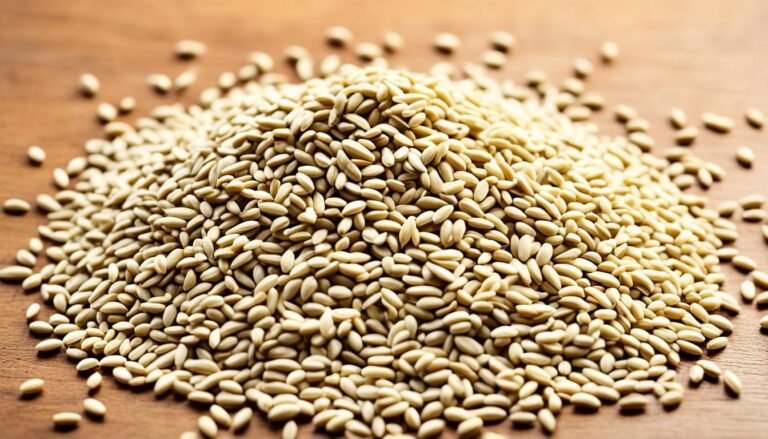



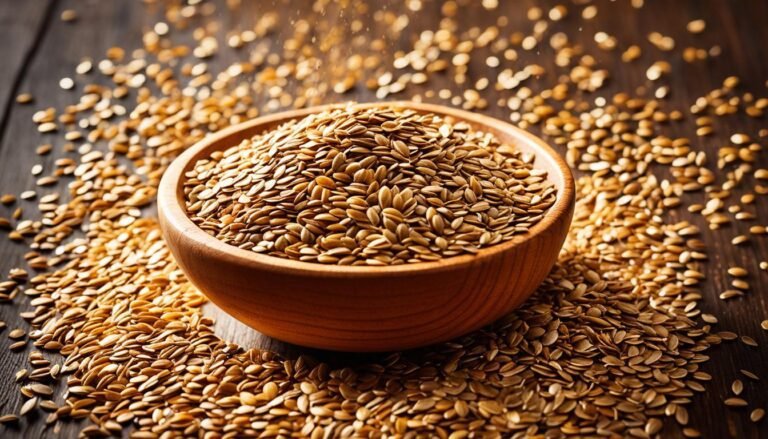

One Comment